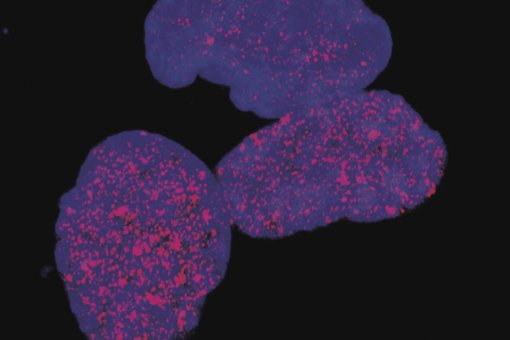Images
Participants

Contact

A new study in collaboration with the Genomic Instability and Cancer Laboratory at IRB Barcelona and led by the University of Copenhagen, reveals that TLK2 displays lower levels of activity in intellectual disability and that it is possible to inhibit it in breast cancer, where it is overactive.
The study suggests that the enzyme may be a target for potential therapies.
(Source: University of Copenhaguen)
In order to maintain genome stability in the cells the enzyme TLK2 constantly strives to attach phosphate to proteins. It activates specific functions in the cell and helps to stabilise the cell nucleus, which is of critical importance. In recent years the enzyme has been linked to various diseases. For example, researchers have discovered that the gene coding for the enzyme is overexpressed in patients suffering from ER-positive breast cancer and mutated in intellectual disability, but up until now no one has been able to outline the behaviour of the enzyme.
Now researchers from the University of Copenhagen in collaboration with Travis Stacker form the the Genomic Instability and Cancer Lab in the Institute for Research in Biomedicine (IRB Barcelona) have taken a big step forward and managed to outline the enzyme all the way to the molecular level using X-ray crystallography.
Their study, published in the scientific journal Nature Communications, suggests that the enzyme activity diminishes in patients suffering from intellectual disability. Conversely, it seems to be possible to inhibit the enzyme in patients with breast cancer, where it is overactive.
The researchers have studied the enzyme in detail at molecular level. They have used biochemical methods and advanced techniques within molecular biophysics to produce a so-called molecular description of the enzyme’s crystal structure. This is important because it gives the researchers insight into the behaviour of the enzyme at atomic level.
Go to the complete press release (University of Copenhaguen)
About IRB Barcelona
The Institute for Research in Biomedicine (IRB Barcelona) pursues a society free of disease. To this end, it conducts multidisciplinary research of excellence to cure cancer and other diseases linked to ageing. It establishes technology transfer agreements with the pharmaceutical industry and major hospitals to bring research results closer to society, and organises a range of science outreach activities to engage the public in an open dialogue. IRB Barcelona is an international centre that hosts 400 researchers and more than 30 nationalities. Recognised as a Severo Ochoa Centre of Excellence since 2011, IRB Barcelona is a CERCA centre and member of the Barcelona Institute of Science and Technology (BIST).




